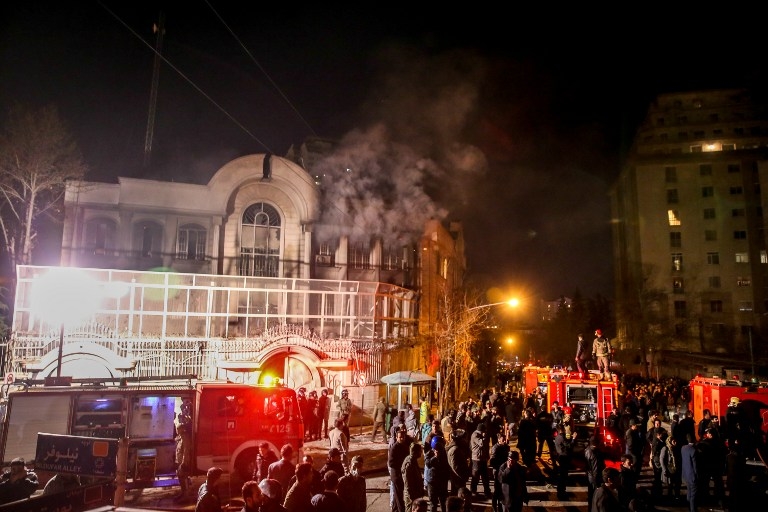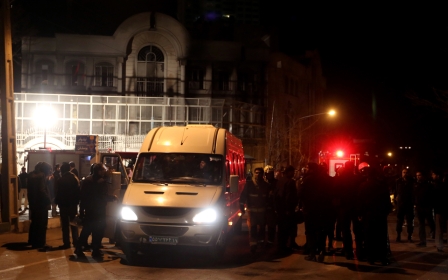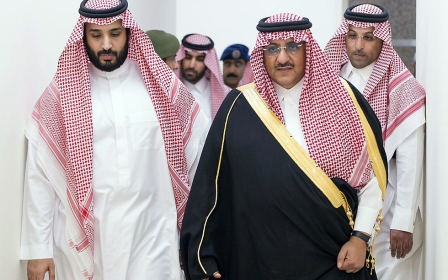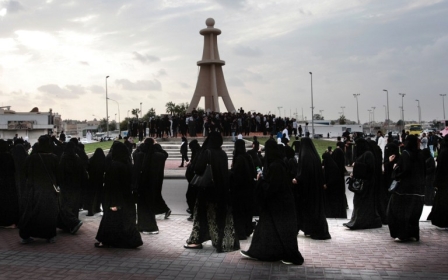Saudi-Iran tensions escalate after night of protests over executions

Iran's supreme leader said on Sunday that Saudi Arabia will face "divine revenge" for executing a top Shia cleric whose death sparked protests in which the kingdom's embassy in Tehran was firebombed.
Ayatollah Ali Khamenei's remarks come after a night which also saw the Saudi consulate in the Iranian city of Mashhad set on fire, and protest rallies held in Saudi's Eastern Province, Bahrain, India and outside the Saudi embassy in London.
While he condemned the execution of Sheikh Nimr al-Nimr, Iranian President Hassan Rouhani on Sunday denounced the attacks on the kingdom's embassy and consulate in Tehran as "totally unjustifiable".
"The actions last night by a group of radicals in Tehran and Mashhad leading to damage at the Saudi embassy and consulate are totally unjustifiable, as the buildings should be legally and religiously protected in the Islamic Republic of Iran," Rouhani said, quoted by the official IRNA news agency.
Further demonstrations were expected on Sunday in Lebanon and Tehran.
In the eastern Saudi city of Qatif, symbolic funerals for four people executed, including Nimr, had been scheduled to be held on Sunday, but were cancelled as local leaders attempted to keep the situation calm in the community, a local, who preferred to remain anonymous for security reasons, told Middle East Eye.
The four were buried by the state on Saturday in an unknown location, the local said.
The families of those executed were not consulted, Mohammed al-Nimr, the shiekh's brother, tweeted.
Khamenei called the killing of Nimr "a political mistake by the Saudi government" which would "haunt its politicians".
"The unjustly spilt blood of this martyr will have quick consequences," Khamenei told clerics in the Iranian capital. "God will not forgive."
Top officials in Iraq, Lebanon and Syria also condemned the execution of Nimr, a force behind anti-government protests in Saudi Arabia in 2011 in the country's east, while officials in the United Arab Emirates and Bahrain defended Saudi Arabia, saying the executions were necessary to confront militant threats.
Along with the 56-year-old cleric, 46 others were put to death on Saturday, most of whom the Saudi interior ministry said had been involved in al-Qaeda attacks in the kingdom between 2003 and 2006.
Iran and Saudi have also summoned their respective envoys, with Iran's foreign ministry protesting against Nimr's execution and Saudi officials calling Iranian criticism of the executions "blatant interference" in its internal affairs.
In Tehran, the Saudi embassy was ransacked on Saturday evening after protesters threw petrol bombs and stormed the building. The kingdom's consulate in Mashhad, Iran's second-biggest city, was also set on fire.
The embassy demonstrators were cleared out by police and 40 arrests have been made, Tehran's prosecutor told the ISNA news agency, adding that more detentions could follow.
"The fire has destroyed the interior of the embassy," an eyewitness told AFP.
Middle East Eye propose une couverture et une analyse indépendantes et incomparables du Moyen-Orient, de l’Afrique du Nord et d’autres régions du monde. Pour en savoir plus sur la reprise de ce contenu et les frais qui s’appliquent, veuillez remplir ce formulaire [en anglais]. Pour en savoir plus sur MEE, cliquez ici [en anglais].




